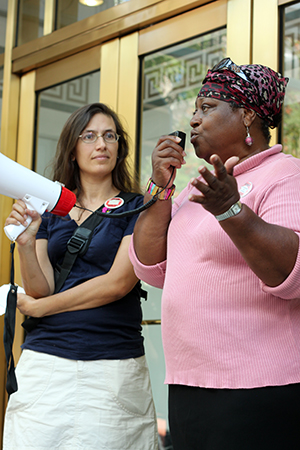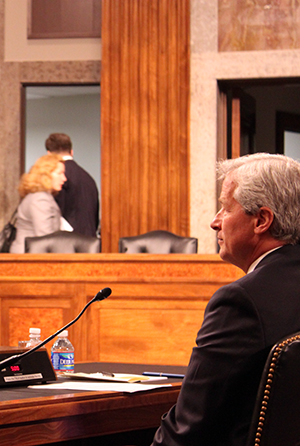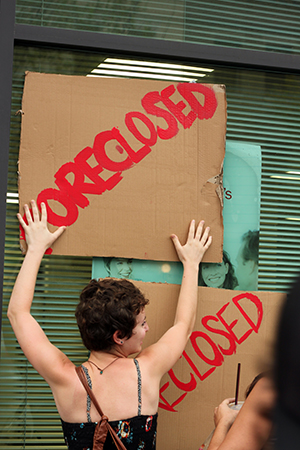 A couple years ago, a survey found that one in five Americans don’t identify with any religion. For Americans under thirty, the number was far higher – more like one third. This report is being cited constantly throughout the religious-nonprofit world. In many quarters, there seems to be a deep sense of shock at the decline in religious membership.
A couple years ago, a survey found that one in five Americans don’t identify with any religion. For Americans under thirty, the number was far higher – more like one third. This report is being cited constantly throughout the religious-nonprofit world. In many quarters, there seems to be a deep sense of shock at the decline in religious membership.
Me? I’m not surprised at all. What does surprise me is our failure to see that affiliation with a traditional, God-centered religion is no longer the primary way that many Americans express their deeply rooted need for faith. We humans are relentlessly religious animals, and post-modern America is no exception. We’re just embracing a different kind of faith.
A powerful religious system has swept across America in the last fifty years, and it has little to do with our traditional ideas about what religion looks like. This new faith is all but invisible to eyes that have been trained to view religion as only those systems with God at the center. Though few seem to see it, our nation is slowly being converted to an apparently non-religious religion. It is a universal faith, a world religion that has taken root everywhere that armies have marched and Coca Cola has been bottled.
 The rituals of this faith can be observed at our great national festivals, such as the Superbowl and the State of the Union address. The priests of this religion wear suits and ties, officiating over the mysteries of currency fluctuations, interest rates and stock markets. Our new state church is one of power and prosperity, whitewashed with beautiful words like honor, freedom and democracy. These words and rituals are administered like a drug, to numb our moral sense in the face of injustice. They serve both to reinforce and conceal the new normal.
The rituals of this faith can be observed at our great national festivals, such as the Superbowl and the State of the Union address. The priests of this religion wear suits and ties, officiating over the mysteries of currency fluctuations, interest rates and stock markets. Our new state church is one of power and prosperity, whitewashed with beautiful words like honor, freedom and democracy. These words and rituals are administered like a drug, to numb our moral sense in the face of injustice. They serve both to reinforce and conceal the new normal.
While some sectors of the religious establishment are panicking about the rise of religious-nonaffiliation, I would like to suggest that the emergence of the nones is not the real problem. The true crisis has been brewing for much longer, and we as Christians have been complicit in creating it. The Christian community has embraced the idols of the unrestrained market and the self-interested and hypocritical poses of electoral politics, all the while neglecting the weightier matters of economic justice and love of neighbor. We have used God as a mask and shield for our will to power, a convenient rallying cry to cover over our own spiritual nakedness. It is precisely this kind of compromised, false religion that many of the nones are rejecting, and all of us should be thankful for that!
The choice that we are facing is not whether we will be a country of believers or non-believers. The idea that the nones are non-religious is just another part of this new religion’s cloak of invisibility. Of course the nones are religious! The religiously unaffiliated are, in fact, deeply faith-based people. We all are. Rather, we must make a decision about what we will place our trust in. Whether we claim religious affiliation or not, whether we believe in God or not, each one of us must determine who or what we will serve. Will we dedicate ourselves to life, liberty, and the pursuit of happiness? To a new American century? To the American Dream?
 There is an alternative available to us, though it is one that will put us in sharp conflict with the present order. There is a President whose State of the Union address is given not to score political points, but to establish true justice and peace. There is an Economy that exists not to enrich the 1%, but to ensure that everyone has enough and that the earth is restored to its intended beauty. There is a God who does not rely on bloodshed to support his power, but instead endures the suffering we inflict, in order to demonstrate his great love for us.
There is an alternative available to us, though it is one that will put us in sharp conflict with the present order. There is a President whose State of the Union address is given not to score political points, but to establish true justice and peace. There is an Economy that exists not to enrich the 1%, but to ensure that everyone has enough and that the earth is restored to its intended beauty. There is a God who does not rely on bloodshed to support his power, but instead endures the suffering we inflict, in order to demonstrate his great love for us.
Before we can truly embrace this radical reign of God, however, we first must unmask the deeply religious claims of our current political and economic system. We cannot understand who Jesus is until we see that he is President of presidents, and that his authority over our lives is absolute. Unlike our earthly political systems, his administration brings peace and healing, justice and joy for everyone who seeks the truth. He puts himself last so that each one of us can experience the amazing power of his love.
Are we ready to embrace this fundamentally different system, one based in God’s selfless love for us rather than the dazzle of human might and the allure of self-interest? There is good news for each one of us, whether we are religious believers, atheist/agnostics, or one of the many nones who don’t really care about religion. There is an alternative to the violence and selfishness of empire – an identity to be found that goes beyond who we vote for, what we consume, or who our friends are. There is hope beyond the world that has been pulled over our eyes.
What might it look like for us to embrace this hope together? Regardless of whether we affiliate ourselves with a particular religious institution, what could it look like to center ourselves on Jesus and his amazing example of fearless love? How might we be drawn into communities that go far beyond stale religious rituals, discovering instead the whole-wheat bread of life that we’ve been hungering for?